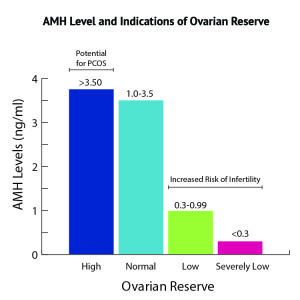As you enter into the journey of fertility treatments—whether it’s to conceive or to preserve your ability to conceive in the future through egg freezing—there are many tests that your doctor will order. One of these tests is to evaluate the number of eggs remaining within your ovaries, called your ovarian reserve. There are many tests that your doctor may use to help predict your ovarian reserve. One of these tests is your anti-Müllerian hormone (AMH) level.
Each egg in the ovary is housed in a follicle. The follicle is made up of cells that support egg maturation and produce hormones. The anti-Müllerian hormone is produced by the supporting cells of follicles—called granulosa cells. It’s from these granulosa (supporting) cells in follicles that recruit an egg from the dormant pool of resting follicles (but are not yet ready to be stimulated to ovulate) that AMH is produced. Because your AMH level is not influenced by where you are in your menstrual cycle, you can have your AMH level measured at anytime. While your AMH level is related to your ovarian reserve, and therefore your egg number, it does not necessarily provide information about your egg quality.
What does your AMH level reveal?
Studies show that physicians can use an AMH measurement to help predict the response to treatment, or the number of eggs expected to be retrieved. While it doesn’t predict the quality or potential of those eggs, the number of eggs retrieved is important because the greater the number of eggs, the higher the probability of pregnancy.
What does your AMH level say about egg quality?
Unfortunately there is not a simple test for egg quality. As a woman ages, the size of her ovarian follicle pool decreases and her egg quality declines. Subsequently, the probability of a healthy pregnancy declines.
A woman’s AMH level decreases until it is undetectable at the time of menopause.
At Shady Grove Fertility, your doctor will use both your AMH level and your age to help predict your success with fertility treatment and determine which treatment options are good options for you. Similarly, if you’re considering egg freezing, your physician will test your AMH level to determine if you’re a good candidate for the process.
What is a normal AMH level?
Although the test has been in routine use for many years, experts have yet to reach a consensus when it comes to what’s considered “normal.” The graph below has AMH interpretation guidelines:

While each woman is different in where her ovarian reserve starts and the rate of change that occurs, the one thing in common is that ovarian reserve naturally decreases as women age. This is largely genetically determined; however, there are environmental factors that play a role as well. Smoking is a well known environmental factor that can damage the eggs leading to an accelerated rate of decline in egg numbers and early menopause.
What medical conditions affect the AMH level in your body?
Women with polycystic ovary syndrome (PCOS) generally have a higher number of early antral follicles resulting in a higher baseline AMH level. Women who are older, or who have undergone medical treatments that are toxic to the ovaries (such as chemotherapy or radiation therapy) may have a lower number of eggs remaining and therefore a lower baseline AMH level.
The most important modifying factor of ovarian reserve is age. A younger patient (<35 years old) who has a decreased ovarian reserve may still have high egg quality because of her age. Age—in combination with an assessment of ovarian reserve and the other elements of your fertility—is important when considering egg freezing.
How do physicians test the AMH level?
Your primary care physician, OB/GYN, or reproductive endocrinologist can order AMH testing as part of ovarian reserve testing. The clear results provided through AMH testing—even better than follicle-stimulating hormone (FSH)—and its ability to identify a diminished ovarian reserve offers providers information earlier regarding a potentially serious fertility problem.
For more information about AMH testing and egg freezing, please speak with one of our New Patient Liaisons by calling 1-877-411-9292.
Medical contribution by Stephanie Beall, M.D., Ph.D., of the Shady Grove Fertility Columbia and Towson, Maryland offices.






